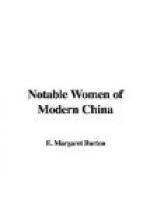Both the girls won many friends among both students and faculty. Ida was elected to the secretaryship of her class in her Junior year. Their record for scholarship was so enviable that the assertion was often made, “They must either be remarkably clever, or they must have applied themselves with unusual devotion.” They led their class in their Junior year, and in their Senior year were surpassed by only one student. Dr. Breakey, specialist in skin troubles, on whose staff they worked during their Senior year, speaks warmly of their earnestness and devotion to their work. Another professor said at the time of their graduation, “They will be a credit to the University of Michigan. The society which provided for their course will never regret having done so.”
As their study at the University drew to a close, the young physicians received many evidences of the appreciation that was felt for the work they had done. Before commencement a reception was given them in the Methodist church of Ann Arbor, at which each of them received a case of valuable surgical instruments. Many other gifts were also showered upon them,—from medical cases, cameras, clocks, and bedquilts, to books and dainty handkerchiefs.
In order not to attract attention they had adopted American dress during their stay in Ann Arbor; but their graduation dresses were sent from China, made in Chinese style, of beautiful Chinese silk, with slippers of the same material,—Ida’s blue, Mary’s delicate pink. Seven hundred and forty-five students received their diplomas at that commencement, but to none was accorded the universal and prolonged applause which broke forth as the two young Chinese women stepped on the platform to take their diplomas from President Angell’s hands. Even the medical faculty applauded heartily, the only time that the staff joined in the demonstrations of the audience. One who was in the audience says, “Their bearing and dignity made us very proud of them.” President Angell was much interested in them and said to their friends, “Their future career will be watched with every expectation of eminent success.”
The two months succeeding their graduation were spent in Chicago in hospital work, and in the autumn they sailed for China. While they were in America an old gentleman said to Ida, “I am glad you are going back to your country as a physician. Your people need physicians more than they need missionaries.” The Chinese reverence for old age was too great to permit Ida to contradict him, but turning to her friends she said quietly, “Time is short—eternity is long.” So it was not only as a physician, but as a regularly appointed medical missionary that she returned to China.
III
SEVEN YEARS IN KIUKIANG




